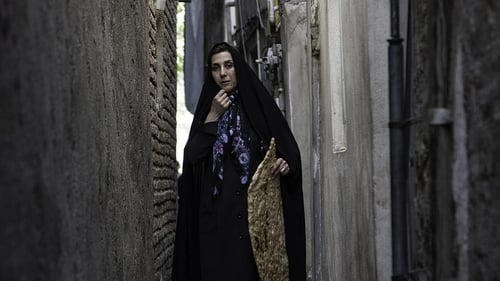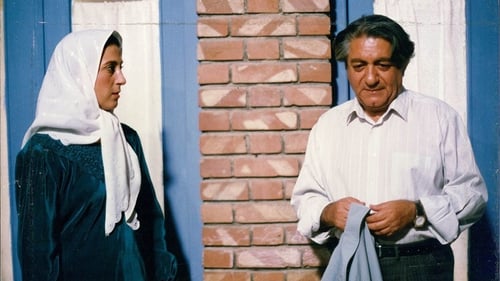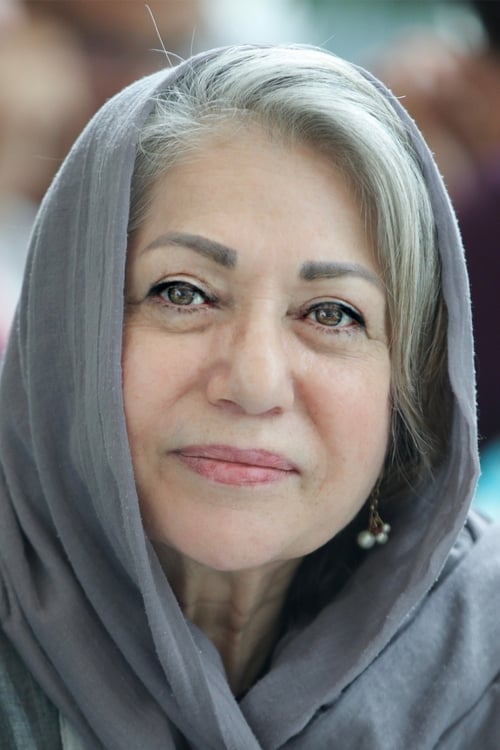Rakhshan Banietemad
출생 : 1954-04-04, Tehran, Iran
약력
Rakhshan Banietemad is a director who was born in 1954 in Tehran, Iran. She started her career in cinema and starred as a director in “Kharej az Mahdoodeh” in 1987. She has won a lot of awards such as the Crystal Simorgh of Best Director for “Narges”, Best Script Award and Best Second Role Actress for “The Blue-Veiled”, the Crystal Simorgh of Best Script for “The May Lady” from Fajr Film Festival. Her other activities are “Mainline” and “Tales”.

voice
This is the story of Fahimeh Akbari, a leading lady in the musical and cultural history of Iran, an exceptional talent whose magical voice and unique style enriched both the folklore and urban musical landscapes of Iran, a pioneer who breathed new life into the music scene by introducing and marrying European tunes and rhythms with that of Gilan, Iran. Fahimeh Akbari, a figure so remarkable and revolutionary that her marked absence seems almost mythical. A familiar tale of a female artist mysteriously forgotten and seemingly erased from history books.

Director
Touran Mirhadi (Khomarloo) is the founder of Farhad School, the Children's Book Council, and the Encyclopedia for Young People. She was also actively involved with close to 20 other institutions dealing with child development and education and supported the formation of dozens of others. She is known as the preeminent architect of childhood institution and the mother of modern education in Iran. This film follows the efforts and preoccupations of Ms. Touran Mirhadi in the last four years of her life. It shows how she strove to enrich the field of child education in Iran to the age of 89, always maintaining that peace was to be cultivated at childhood.

Producer
Award-winning Iranian filmmaker Rakshan Banietemad ends her eight-year hiatus from feature filmmaking with this ingenious, mosaic-like narrative, which knits together the stories of seven characters to create a microcosm of Iranian working-class society.

Screenplay
Award-winning Iranian filmmaker Rakshan Banietemad ends her eight-year hiatus from feature filmmaking with this ingenious, mosaic-like narrative, which knits together the stories of seven characters to create a microcosm of Iranian working-class society.

Director
Award-winning Iranian filmmaker Rakshan Banietemad ends her eight-year hiatus from feature filmmaking with this ingenious, mosaic-like narrative, which knits together the stories of seven characters to create a microcosm of Iranian working-class society.

Producer
Bani-Etemad's documentary short was made during the months before last year's controversial elections in Iran. Filming a diverse coalition of women's rights activists discussing their opinions on pressing contemporary issues, Bani-Etemad asked three of the four presidential candidates to view the footage for comment, with Mahmoud Ahmedinejad declining to participate.

Director
Bani-Etemad's documentary short was made during the months before last year's controversial elections in Iran. Filming a diverse coalition of women's rights activists discussing their opinions on pressing contemporary issues, Bani-Etemad asked three of the four presidential candidates to view the footage for comment, with Mahmoud Ahmedinejad declining to participate.

Screenplay
Persian Carpet is an omnibus film produced by Iran's National Carpet Center and Farabi Cinema Foundation where 15 renowned Iranian directors contributed films on the subject of Persian carpet. Carpets are the reflection of the cultural and historical identity of Iran.

Director
Persian Carpet is an omnibus film produced by Iran's National Carpet Center and Farabi Cinema Foundation where 15 renowned Iranian directors contributed films on the subject of Persian carpet. Carpets are the reflection of the cultural and historical identity of Iran.

Producer
The uneasy relationship between a mother and daughter is made all the more turbulent by drug abuse in this downbeat drama from Iranian filmmakers Rakhshan Bani-Etemad and Mohsen Abdolvahab

Screenplay
The uneasy relationship between a mother and daughter is made all the more turbulent by drug abuse in this downbeat drama from Iranian filmmakers Rakhshan Bani-Etemad and Mohsen Abdolvahab

Director
The uneasy relationship between a mother and daughter is made all the more turbulent by drug abuse in this downbeat drama from Iranian filmmakers Rakhshan Bani-Etemad and Mohsen Abdolvahab

Screenplay
A mother's courage, hardship, and love, in times of war. In 1988, during the Iran-Iraq war, Gilane escorts her pregnant daughter, Maygol, from the relative calm of their village, Espili, into war-torn Tehran to search for Maygol's husband, Rahman. The journey is arduous and what they find when they reach the capital is dismaying and frightening. Fifteen years later, as another war begins in Iraq, Gillane is at home caring for her son Ismael, who suffers from epilepsy, a byproduct of war. As she cares for him, she hopes for a visit from the doctor and from another daughter, Atefah. "Better be a dog than a mother," she says.

Director
A mother's courage, hardship, and love, in times of war. In 1988, during the Iran-Iraq war, Gilane escorts her pregnant daughter, Maygol, from the relative calm of their village, Espili, into war-torn Tehran to search for Maygol's husband, Rahman. The journey is arduous and what they find when they reach the capital is dismaying and frightening. Fifteen years later, as another war begins in Iraq, Gillane is at home caring for her son Ismael, who suffers from epilepsy, a byproduct of war. As she cares for him, she hopes for a visit from the doctor and from another daughter, Atefah. "Better be a dog than a mother," she says.

A documentary dealing with the life of Ahmadreza Ahmadi, an Iranian Poet.

Producer
Documentary by Rakhshan Bani-Etemad, an Iranian female director. This film portrays two aspects of the Iranian presidential election of 2001.

Director
Documentary by Rakhshan Bani-Etemad, an Iranian female director. This film portrays two aspects of the Iranian presidential election of 2001.

Producer
Tuba works daily at a grueling textile factory in Iran, returning home every night to deal with the rest of her problematic family, which includes: a pregnant daughter whose husband beats her regularly; a teenage son, who's been getting into trouble due to his burgeoning career in radical politics; and an older son who goes to great lengths--such as attempting to sell the family's meager house--in order to get an engineering job in Japan as a means of getting out of Iran.

Screenplay
Tuba works daily at a grueling textile factory in Iran, returning home every night to deal with the rest of her problematic family, which includes: a pregnant daughter whose husband beats her regularly; a teenage son, who's been getting into trouble due to his burgeoning career in radical politics; and an older son who goes to great lengths--such as attempting to sell the family's meager house--in order to get an engineering job in Japan as a means of getting out of Iran.

Director
Tuba works daily at a grueling textile factory in Iran, returning home every night to deal with the rest of her problematic family, which includes: a pregnant daughter whose husband beats her regularly; a teenage son, who's been getting into trouble due to his burgeoning career in radical politics; and an older son who goes to great lengths--such as attempting to sell the family's meager house--in order to get an engineering job in Japan as a means of getting out of Iran.

Writer
An anthology directed by Mohsen Makhmalbaf (Testing Democracy) and Dariush Mehrjui (Dear Cousin is Lost)

Director
An anthology directed by Mohsen Makhmalbaf (Testing Democracy) and Dariush Mehrjui (Dear Cousin is Lost)

Screenplay
Forough Kia is a film-maker who got divorced from her husband many years ago and now is living with her son Maani. She decides to make a documentary about perfect mothers. In order to do so she meets many mothers to chose the perfect mother among them. She finally decides to quit making this film because of tiredness but doctor Rahbar wants her to continue. Maani is teasing her every day preventing her from marrying doctor Rahbar but she finally decides that she wants to marry him.

Producer
Aboard the top deck of a cruise ship, Baran, a young wealthy girl, notices a native boy who is dancing joyfully to beating drums. Baran arrives at a plush hotel on the mainland, however she seems somewhat disconsolate. Later she finds the native boy again and they begin to bond, playfully exploring the beach resort together. Later, the two go aboard a row-boat and the native dives down into the water to collect a pearl from the seabed for her. However, the ending leaves the audience to wonder if he was a figment of Baran's longing imagination all along. Well-shot and with a strong performance from Baran Kosari, this film perfectly captures the bittersweet pangs of young love.

Screenplay
Aboard the top deck of a cruise ship, Baran, a young wealthy girl, notices a native boy who is dancing joyfully to beating drums. Baran arrives at a plush hotel on the mainland, however she seems somewhat disconsolate. Later she finds the native boy again and they begin to bond, playfully exploring the beach resort together. Later, the two go aboard a row-boat and the native dives down into the water to collect a pearl from the seabed for her. However, the ending leaves the audience to wonder if he was a figment of Baran's longing imagination all along. Well-shot and with a strong performance from Baran Kosari, this film perfectly captures the bittersweet pangs of young love.

Director
Aboard the top deck of a cruise ship, Baran, a young wealthy girl, notices a native boy who is dancing joyfully to beating drums. Baran arrives at a plush hotel on the mainland, however she seems somewhat disconsolate. Later she finds the native boy again and they begin to bond, playfully exploring the beach resort together. Later, the two go aboard a row-boat and the native dives down into the water to collect a pearl from the seabed for her. However, the ending leaves the audience to wonder if he was a figment of Baran's longing imagination all along. Well-shot and with a strong performance from Baran Kosari, this film perfectly captures the bittersweet pangs of young love.

Director
Forough Kia is a film-maker who got divorced from her husband many years ago and now is living with her son Maani. She decides to make a documentary about perfect mothers. In order to do so she meets many mothers to chose the perfect mother among them. She finally decides to quit making this film because of tiredness but doctor Rahbar wants her to continue. Maani is teasing her every day preventing her from marrying doctor Rahbar but she finally decides that she wants to marry him.

Screenplay
An elderly owner of a tomato farm and sauce factory, after his wife's death, falls in love with one of the workers of the factory endangering his relationship with his daughters and in-laws. While everybody in the big family persuades the old man to abandon the relationship with the poor girl, the old man makes his final choice of love.

Director
An elderly owner of a tomato farm and sauce factory, after his wife's death, falls in love with one of the workers of the factory endangering his relationship with his daughters and in-laws. While everybody in the big family persuades the old man to abandon the relationship with the poor girl, the old man makes his final choice of love.

Director
A documentary about life and career of an eighty-year-old Iranian actress, Iran Daftari.

Producer
A sharp-edged look at people who live outside the constraints of Islamic law.

Writer
A sharp-edged look at people who live outside the constraints of Islamic law.

Director
A sharp-edged look at people who live outside the constraints of Islamic law.

Director
Directed by Rakhshan Bani-Etemad.

Director
Morteza Olfat is an ordinary employee who has lots of problems in his life. One day, he happens to find fifty thousand dollars. He says nothing to anyone and tries to exchange the cash.

Director
After spending all his money buying a piece of land that was already sold to someone else, Nasrallah Madadi finds himself in trouble. To solve his money problems, he then decides to be the offender of fraud rather than its victim. Getting himself involved with a pair of criminals, he begins a crooked business selling a same yellow taxi to different buyers, only to steal it back from them and sell it again. In a fascinating portrayal of human nature, Canary Yellow follows Nasrallah through the ups and downs of his double-sided experience of crime. But will it all end with the better life for his family he hopes for?

Director
Mohammad Javad Halimi is a simple government's employer who manages after years to buy a house for himself outside the city's limits. But in the second night in his new house a thief is coming to his house. He manages to catch the thief but delivering him to the authorities is another story.






